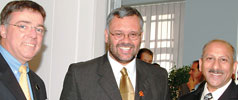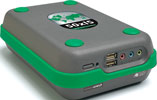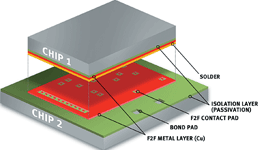
Southern Africa
Global trade and trends in the electronics and ICT sectors was the theme of the recent 10th Annual World Electronics Forum (WEF), held this year in Washington DC and attended by Eileen Leopold, director of the South African Electrotechnical Export Council (SAEEC), also representing the Electronics Industry Federation (EIF). The prevailing theme was that every nation is focusing on high end processes such as R&D, design and engineering, which places the onus on WEF members to advocate public policy that encourages corporate investment and the preservation of an open world economy in which innovation is encouraged. Another issue of concern was the politicising of offshore outsourcing. While this is generally presented as a purely cost cutting measure, WEF members made it clear that a range of factors influenced offshoring decisions. Another critical topic of discussion was the way in which countries around the globe are meeting the challenge of electronics recycling and environmental design. "It is an eye-opener to realise how little is known internationally about South Africa's electronics and communications capabilities. During our stay we had a fascinating and insightful visit to Verisign and yet not one person knew that key technology came from South Africa, or had even heard of Mark Shuttleworth," commented Leopold on her return. "The electronics sector in both the USA and UK has been fast tracked by the formation of an alliance of all industry bodies in the sector. We expect that more cooperation and collaboration between professional associations in the sector in South Africa will strengthen our position in world markets," she added.
Ancillary telecommunications equipment supplier, Webb Industries, has announced it is set to benefit from the formalisation of broad-based black economic empowerment (BEE) at its holding company, Jasco Electronics Holdings. Following a thorough review and evaluation by economic empowerment rating agency EmpowerDEX, Jasco was rated as a BBB entity. Webb Industries, as one of Jasco's three divisions, is thus formally recognised as a black empowered company, ensuring that it meets the criteria for preferential procurement in the telecommunications industry.
Vodacom has signed a partnership with Vodafone. Vodacom said it expects the partnership to translate into realisable benefits: "By becoming part of the Vodafone brand, we can offer multinational companies a seamless global service and value-adding corporate deals. In addition, we gain access to Vodafone's global products and services," said Vodacom Group CEO, Alan Knott-Craig.
Prism Holdings scooped the top award in the Technology Top 100 competition in the large enterprise category for companies operating in the ICT Software, Services and Solutions sector. Prism was awarded joint first place with Flextronics South Africa. Prism won for its innovative Mobile Voucherless Top-Up (M-VTU) solution, technology which enables the distribution of cellular airtime via a standard GSM handset with access to a cellular network. Already taking South-East Asia by storm, Prism believes it also offers fantastic job creation opportunities for Africa.
Grintek Technologies has relocated to new premises at 3rd Floor, Rosebank College House, 5 Waterkant Mall, Cape Town. The premier of the Western Cape, Ebrahim Rasool, who officially opened the new offices, said the decision to relocate the office to the centre of town is a vote of confidence in the future of the provincial capital. He paid tribute to the Grintek Group for its pioneering role in the field of Black Economic Empowerment and for its reputation as a provider of turnkey solutions in the fields of technology, energy management, telecommunications and defence. Gavin Swanepoel, chief operating officer of the Grintek Technologies division, said the group is committed to the future of the Western Cape as a growing economic force in the country and to the Cape Town city centre as a vibrant and exciting new hub for business development. Pictured below is (from left to right) Gavin Swanepoel, Ebrahim Rasool, and Majid Mowzer, Grintek regional manager in Cape Town.

Overseas
Business
On Semiconductor announced Q3 2004 revenues of $318,4m, a decrease of 5% from the second quarter of 2004. Net income for the quarter was $15,7m, which included a loss on debt prepayment of $3m. During the Q2 of 2004, the company reported a net loss of $3,5m. The company lost $18,6m, on sales of $264,8m in the like period a year ago. On Semi anticipates that total revenues will be flat to down 4% sequentially in the fourth quarter.
Agere Systems posted a net loss of $127m, on sales of $439m in its fourth 2004 fiscal quarter, reflecting $132m in restructuring charges. For fiscal year 2004, Agere reported a net loss of $90m on sales of $1,91 bn, compared with a loss of $338m on sales of $1,84 bn in fiscal 2003.
Xilinx announced revenues of $403m in its second quarter, a sequential decrease of 5% from the prior quarter and an increase of 28% from the same quarter a year ago. Net income was $86m compared to $56m.
Companies
An investor group led by Francisco Partners and Shah Capital Partners has acquired C-Mac Microtechnology from Solectron. C-Mac Microtechnology specialises in the design and manufacture of high-reliability products used in harsh environments, often at extremes of temperature or frequency. It comprises two business units: C-Mac Microsystems Solutions and C-Mac Frequency Products.
IC Electronic Components has acquired West Highland Semiconductor of Argyll, UK. West Highland Semiconductor was established in 1996 as a supplier of obsolete discrete semiconductors with a focus on TO-39, TO-66 and TO-3 cases.
Beach Solutions, an EDA tools company of Reading, England, has acquired Scottish company VCX Software. VCX was originally created as the 'Virtual Component Exchange' to act as a global trading and licensing clearinghouse for intellectual property licensing transactions.
Royal Philips Electronics and Lumileds Lighting have announced a partnership to develop and market modular LED lighting solutions for the automotive industry, extending an existing relationship between the two companies. The modular lighting solutions will incorporate Lumileds' Luxeon technology, with Philips' Automotive Lighting group supplying design, development and integration. The modules are expected to simplify LED lighting design and accelerate the adoption of solid-state lighting solutions by automotive manufacturers.
ARM Holdings is working with Handshake Solutions, a spin-off from Royal Philips Electronics, to produce an ARM 32-bit RISC processor that does not require a clock signal to operate, saving power. Clockless logic design techniques (asynchronous logic) is an alternative style of circuit design that does away with the clock signals of conventional logic, and uses logic modules that are self-timed and that pass results among one another using handshaking protocols.
The innovative radio wave solutions firm, Antenova, has signed a licensing deal with Galtronics, a global market leader in antenna design and manufacturing. The deal gives Galtronics the rights to use one of Antenova's high dielectric antenna (HDA) designs exclusively for its customers in cellular handsets and cellular PC card devices.
NTT DoCoMo, Intel and IBM have started promoting a jointly-developed specification for increasing the security of mobile commerce applications. The 'Trusted Mobile Platform' platform defines a set of hardware and software components for use to build devices offering different levels of security. The specifications have been released for industry review.
Industry
Semiconductor Industry Association (SIA) released its annual forecast for 2004 to 2007, predicting sales to rise 28,5% to a record $213,8 bn in 2004 but remain essentially flat in 2005, as the excess inventory problems many chip companies are now reporting make their impact felt. It projects that sales will grow by 6,3% to $227,2 bn in 2006 and by 14,2% to $259,4 bn in 2007. For the longer term, the new forecast projects a CAGR of 11,8% through the forecast period. Last year's chip sales were $166,4 bn, according to the SIA, while the previous record for chip sales was $204 bn in 2000.
By product group:
Memory: projected to decline in 2005. The DRAM market was $16,7 bn in 2003; projected to grow by 61,2% to $26,9 bn in 2004, but will decline by 14,7% to $23 bn in 2005. It will grow by 9,4% to $25,1 bn in 2006 and by 20% to $30,1 bn in 2007. The flash market was $11,7 bn in 2003; projected to grow by 34,6% to $15,8 bn in 2004, decline by 1,8% to $15,5 bn in 2005, grow by 3,2% to $16 bn in 2006, and grow by 14,7% to $18,3 bn in 2007.
Discrete components: worth $13,3 bn in 2003; projected to grow by 19,4% to $15,9 bn in 2004, but will decline by 0,2% to $15,9 bn in 2005. It will grow by 2,9% to $16,4 bn in 2006 and by 7,7% to $17,6 bn in 2007.
Optoelectronic: projected to be the fastest growing market, was $9,5 bn in 2003; projected to grow by 45,9% to $13,9 bn in 2004, 12,8% to $15,7 bn in 2005, 12,8% to $17,3 bn in 2006, and 15,4% to $20 bn in 2007.
DSP: was $6,1 bn in 2003; projected to grow by 28,2% to $7,9 bn in 2004, 6,9% to $8,4 bn in 2005, 15% to $9,7 bn in 2006, and by 24% to $12 bn in 2007.
Microprocessor: was $27,4 bn in 2003; projected to grow by 9,7% to $30,1 bn in 2004, 2,3% to $30,8 bn in 2005, 5,5% to $32,5 bn in 2006, and 8,5% to $35,2 bn in 2007.
Microcontroller: was $10 bn in 2003; projected to grow by 23,6% to $12.3 bn in 2004, 1,5% to $12,5 bn in 2005, 4,9% to $13,2 bn in 2006, and 14,9% to $15,1 bn in 2007.
Analog: was $26,7 bn in 2003; projected to grow by 16,9% to $31,3 bn in 2004, 1,2% to $31,7% in 2005, 6,4% to $33,7 bn in 2006, and by 17,1% to $39,5 bn in 2007.
The World Semiconductor Trade Statistics (WSTS) has cut its forecast for global chip market growth in 2005 to 1,2%, replacing a previous prediction of 8,5%. It is to be followed by 3,0% annual growth in 2006 and 11,4% annual growth in 2007, according to WSTS. For 2004, WSTS maintained its forecast at 28,5% annual growth to $213,78 bn.
Handelsbanken Capital Markets has projected worldwide semiconductor sales to drop by 3% in September amid the current inventory correction problems in the marketplace.
According to Bishop & Associates' October quarterly connector forecast, the connector industry is having an outstanding year. Orders are up 26,4% through nine months, and sales are up 25,7% through nine months. Amphenol and Molex just reported 3Q04 sales increases of 22% and 29% respectively, and are forecasting continued double-digit growth in Q4 2004 (Amphenol 14,8% and Molex 17%). The group believes its Q 2004 forecast is for continued growth in sales, however, it says the industry will increase sales only 7,6% in Q4 2004, primarily because of a tough comparison to the same quarter in 2003 which was an excellent quarter.
Market researchers, IDC, predict worldwide communications test and measurement revenues are set to grow to $6,7 bn in 2008, after showing an 11% compound annual growth rate from 2003-2008. Agilent remained the market leader with 36,6% market share through the first half of 2004.
India has formed the India Semiconductor Association (ISA) that initially brings together 31 member companies that are Indian subsidiaries of overseas semiconductor and electronic design automation companies. Designed to expand its semiconductor industry, member companies include Indian subsidiaries of Intel, Texas Instruments, Wipro, Qualcomm, Synplicity and Centillium. Universities are also being invited to join the association.
Market research company, Intex Management Services, says that high definition television (HDTV) is now set to reach 7% of European homes by 2009. IMS forecast that around 8 million HDTVs would be sold in Europe in 2009, accounting for almost 17% of all TVs sold in the region.
Hewlett-Packard is expected to remain the world's largest chip buyer in 2004 and in 2005, according to iSuppli. But Dell, in number-two position, will close the gap with HP next year, iSuppli predicts. Retaining its leadership from 2002 and 2003, HP will spend $14,5 bn on semiconductors in 2004, up 31,4% from $11 bn in 2003. iSuppli predicts HP will account for 8,7% of all semiconductor purchasing among the globe's top 160 OEM buyers in 2004.
The EU proposals to ban the use of lead in electronic equipment are likely to accelerate industry's already-growing problem of how it can maintain expensive, long-lifespan equipment when components become obsolete, according to the Component Obsolescence Group (COG). COG said that the increasing pace of technological change is already causing component obsolescence problems for an increasing number of industry sectors which rely on equipment lasting for 10, 20 or up to 40 years.
Gemplus has been presented the 2004 Frost & Sullivan Award for Market Leadership in the highly competitive world market for smartcard readers. The company was the number one smartcard reader supplier in 2003, with a 21% market share, shipping some 1,9 million units.
InterferenceTechnology.com and Flomerics have announced a new technical forum that provides assistance at no charge in simulating electromagnetic compatibility (EMC) design problems. InterferenceTechnology.com is said to be the only online reference site that is completely devoted to EMC issues. Flomerics is the developer of FLO/EMC, a software package dedicated to modelling and simulating EMC problems in electronic design. Addressing EMC late in the design cycle is becoming less tenable as product complexity and densities increase. Designers are now moving towards the use of conceptual analysis to identify and fix problems early in the design process at much lower cost.
VLSI Research has launched an online museum called the Chip History Center (CHC) with the objective of preserving the history of chip manufacturing. The virtual online museum at www.chiphistory.org documents the evolution of the dynamic and fast-moving industry. Companies participating in the CHC's development include Intel, Novellus, Tokyo Electron, and Kulicke & Soffa.
Technology
Advanced Micro Devices (AMD) has announced a low cost computer, called the Personal Internet Communicator (PIC). Said to be priced at $249 with display - to be affordable in developing countries - it comprises AMD's Geode GX500 embedded processor and comes with 128 Mbytes of DDR SDRAM, a 10 Gbyte hard drive, four USB ports, a mouse, keyboard and modem.

Infineon presented the world's first chip card security controller which uses an innovative 'chip-sandwich' technique that involves face-to-face interconnection at the 'Cartes & IT Security 2004' show in Paris. The new SLE88CFX1M00P security microcontroller uses the face-to-face technology to combine a 32-bit security microcontroller with 400 Kbytes of EEPROM, 240 Kbytes of ROM, 16 Kbytes of RAM, and a memory chip with 512 Kbytes of EEPROM, thus providing 1 MB of memory capacity. Due to the short vias connecting both chips, EEPROM access times are identical for both chips. Using the face-to-face interconnection technique and the company's existing technologies like EEPROM or TWINFlash, Infineon said it can build an ISO-compliant chip card microcontroller offering up to 20 MB of memory - more than 100 times the capacity of today's chip card ICs on just double the chip area.


© Technews Publishing (Pty) Ltd | All Rights Reserved